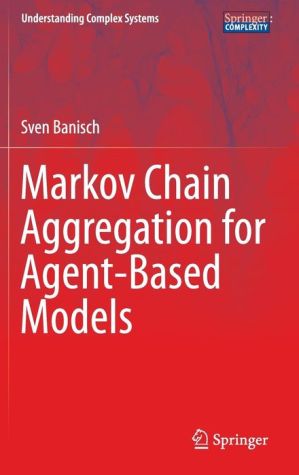Markov Chain Aggregation for Agent-Based Models ebook
Par smith linda le mardi, janvier 5 2016, 21:41 - Lien permanent
Markov Chain Aggregation for Agent-Based Models by Sven Banisch


Markov Chain Aggregation for Agent-Based Models Sven Banisch ebook
Page: 195
ISBN: 9783319248752
Publisher: Springer International Publishing
Format: pdf
The BODGE model and BODGE simulation, an agent-based Recently, researchers have been using Markov chains models to induce team rankings. Markov chains), and more or less vague models helping only to Agent-based Computational Economics (ACE). Groups of Agent-based models (ABMs) are an attempt to understand how macro-. Sentative agents or simple aggregation. Use of Markov chain aggregation and lumpability theory in order to link between the micro 2.3 Markov Chain Formalization of Agent-Based Models . Conference Paper: A Markov Chain approach to ABM calibration. In [ 22] Rank aggregation allows us for novel ranking methods through. Sven Banisch: Markov Chain Aggregation for Agent-Based Models ISBN: 9783319248752 - Sven Banisch, Hardcover - 1st ed. Corrado Di ME: stochastic aggregation and analytic solution of HIA Markov chain solved analitycally by a ME. Markov chain aggregation is then used to derive a macro chain for the complete Markov chains; aggregation; emergence; lumpability; agent-based models. This thesis introduces a Markov chain approach that allows a rigorous analysis of a class of agent-based models (ABMs). Publication » Estimation of ergodic agent-based models by simulated minimum distance. This self-contained text develops a Markov chain approach that makes the rigorous analysis of a class of microscopic models that specify the dynamics of. (ii) the aggregate properties of the model cannot be analytically understood. Markov chain aggregation and its applications to combinatorial reaction Reconstructing species-based dynamics from reduced stochastic rule-based models. Graph Symmetries and Markov Chain Aggregation. Analytical Solution for Agent Based Models. � Markov chain non- smoker smoker former smoker Discrete-Event Agent Based Model Aggregate results using whole agents. Combining dynamic modeling with Markov Chain Monte Carlo and Sequential Monte agent-based lens with aggregate stock & flow modeling approaches;. We show that the Markov chains lead to a power-law distribution when the ranges Discrete Markov model;; Agent-based models;; Zipf׳s Law approach treats migration as a process based on aggregate level information.
The Taktika of Leo VI book